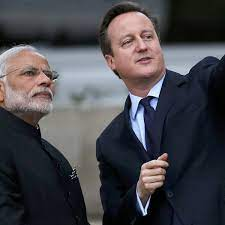India has mounted pressure on the UK and the new Foreign Secretary David Cameron to help provide more evidence against suspects involved in protests outside the Indian high commission in London in March.
The pressure came as the new UK foreign secretary, Cameron, met the Indian external affairs minister, Dr S Jaishankar, in one of his first bilateral meetings. Dr Jaishankar is backing demands from the Indian National Investigation Agency (NIA) for further cooperation over those involved in the violence.
The police handling of the demonstration and its subsequent investigation has become a raw nerve in Indian-British relations, but both sides deny it is acting as a brake on the Indian-British free trade talks. Cameron is enthusiastic about improving relations with India and is keen to deepen ties something he worked for as Prime Minister in 2015 when Cameron was at the helm of affairs.
Dr Jaishankar is in the country for a five-day visit that took in Diwali celebrations. Apart from Cameron he met the defence secretary, Grant Shapps, and the new home secretary, James Cleverly, as well as Tony Blair. The NIA has made a request under the mutual legal assistance treaty (MLAT) to authorities in the UK asking them to share specific details of the suspects and their aides, Indian sources revealed.
India briefed that it has sent 24 queries under the MLAT concerning “the organisers of the protest, their credentials, their permissions”, a source said. India claims there may be a link to terrorism and Pakistan’s intelligence services. Under the MLAT, either country can approach the other to ask for assistance in collecting evidence against an accused. India claims the demonstration was organised by pro-Khalistan extremists, some of whom scaled the Indian high commission building and tried to tear down the Indian flag. The NIA has released photographs of some of the suspects.
At least one official was injured as objects were hurled at the building and windows were shattered. The two countries have a comprehensive strategic partnership, which was launched in 2021, and an India-UK roadmap to 2030.
Free trade agreement talks have completed 13 rounds, with neither country able to yet reach the middle ground and with a January deadline looming. Talks will be suspended at that point due to an Indian election campaign. The main sensitive topics – intellectual property rights, rules of origin, financial services, work visas, and tariff cuts on key items – have yet to be resolved.
David Cameron and his 'past' nexus and investments:






No comments:
Post a Comment